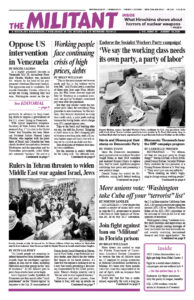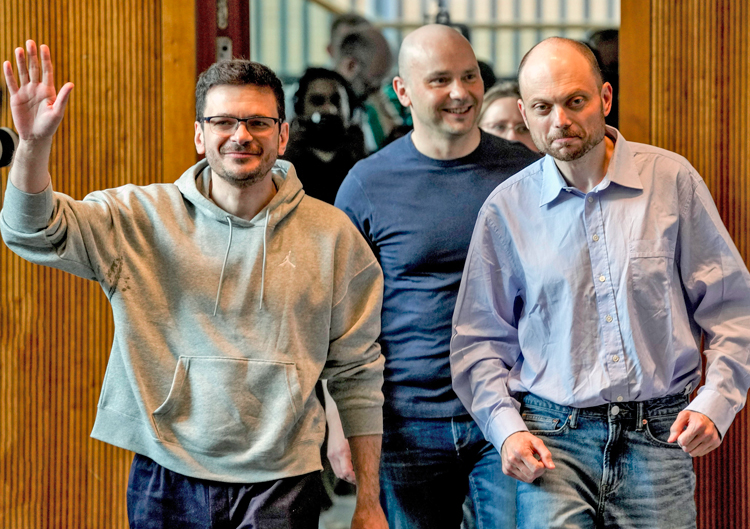In the largest U.S.-Russia prisoner exchange since the Cold War, 24 prisoners flown in from seven countries were swapped at a Turkish airport Aug. 1.
While Washington and its allies released one of Vladimir Putin KGB-styled regime’s most notorious assassins, those released by Moscow included Russians imprisoned for speaking out against Putin’s murderous war in Ukraine and a well-known U.S. reporter for the Wall Street Journal. The governments of Germany, Poland, Norway, Slovenia and the U.S. released eight people, including several alleged Russian spies. Moscow and the regime in Belarus released 16.
Three freed Russian opposition figures, Ilya Yashin, Vladimir Kara-Murza and Andrei Pivovarov, addressed an Aug. 2 press conference in Bonn, Germany.
They all called for fellow political prisoners to be freed. While grateful to be released, both Yashin and Pivovarov said they were deported against their will and wanted to return to Russia to fight for their political views when that becomes possible.
The legal aid group OVD-Info counts 1,289 dissidents in Moscow’s jails with another 3,000 protesters facing politically motivated criminal charges. At least 10 have already died in prison.
A former Moscow city councilman, Yashin had been jailed after he denounced atrocities carried out by Moscow’s forces in the Ukrainian town of Bucha. “I understood my imprisonment not only as an anti-war fight but also as a fight to live in my country and engage in independent politics,” he said.
Pivovarov, a leader of the political rights group Open Russia, was jailed in 2022. The group was outlawed in 2017 for challenging the outcome of elections. “Many of my friends have just been saved from death” as a result of the deal, Pivovarov pointed out. And it will give others hope.
Prominent political prisoners set free
Kara-Murza was sentenced to 25 years in prison for “treason” after opposing Moscow’s war. After two attempts by the FSB secret police to poison him, he was in poor health and expected to “die in Putin’s prison,” he said.
Another prominent dissident released was Oleg Orlov, co-founder of Memorial, a prominent rights group that’s now banned. He has been an outspoken opponent of Moscow’s wars — from the Soviet invasion of Afghanistan in 1979 to Putin’s current invasion of Ukraine.
The 16 released by Moscow and the regime in Belarus included Journal reporter Evan Gershkovich, imprisoned on trumped-up espionage charges; former U.S. Marine Paul Whelan; and Alsu Kurmasheva, who reported for Radio Free Europe/Radio Liberty, a Washington-backed propaganda outlet.
President Joseph Biden trumpeted the releases, keen to burnish his own legacy. The freeing of Russian oppositionists was Putin’s way of getting rid of thorns in his side and achieving what he wanted. Washington has its own record of framing up and jailing its opponents, especially working-class fighters and communists at times of war and sharpening crises.
Putin gets his assassin back
Turkish President Recep Tayyip Erdogan facilitated the exchange, maneuvering between Moscow and Washington.
Vital to Moscow agreeing to the deal was the release by the German government of Vadim Krasikov. A former colonel in the FSB, Krasikov was serving a life sentence in Germany for publicly executing in Berlin a Chechen rebel who had fought against Moscow’s invasion of his country.
In 2014, Krasikov was in an FSB unit protecting former Ukrainian President Viktor Yanukovych, whose pro-Moscow government was toppled by a mass uprising known as the Maidan. Krasikov was part of a Russian sniper team responsible for slaughtering more than 100 protesters.
Krasikov returned to a hero’s welcome by the regime in Moscow. The message is that the Kremlin will use hostages to bargain to free the assassins it uses abroad to advance its expansionist foreign policy. Putin increasingly relies at home on repression by the FSB, which was created out of the Stalinist murder machine, the KGB.
Several collaborators of Russian opposition leader Alexei Navalny were among those freed in the deal. Navalny died suddenly in a remote prison in Arctic Russia in February. St. Petersburg artist Sasha Skochilenko, jailed for seven years for putting anti-war stickers in supermarkets, was also released.
Kara-Murza told the press that every day in prison he got “stacks of letters” from people across the country against the war. “The Kremlin’s propaganda wants to make you believe that everyone in Russia supports the Putin regime and the war. It’s a lie.”
“Changes happen in our country when nobody is expecting them,” Yashin added. “And it’s important for people to understand this not just in Russia but in the West as well.”
The character of the released prisoners shows the utter lack of morality on the part of the Putin regime as against the determination and courage of the Russian oppositionists.


